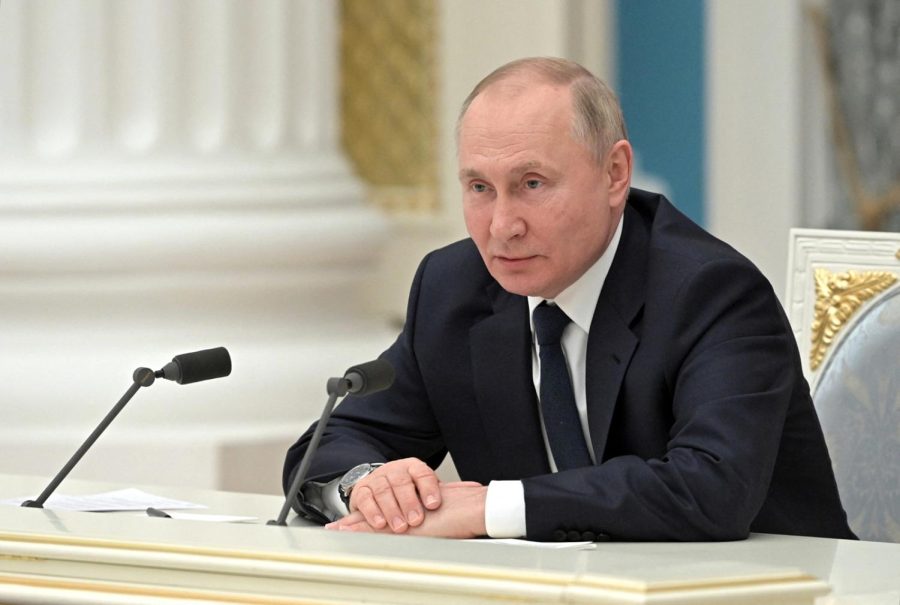Opinion | Blame Putin, but don’t absolve NATO
Photo courtesy Alexey Nikolsky/Sputnik/AFP/Getty Images/TNS
Russian President Vladimir Putin chairs a meeting at the Kremlin in Moscow on Feb. 24. Senior columnist Eddie Ryan argues that Putin should be held accountable for the Ukraine situation, but NATO’s role should also be taken in consideration for what is happening.
March 7, 2022
As I write this, Kharkiv is under siege and a 40-mile convoy of Russian military vehicles is creeping toward Kyiv. By the time this article gets published, things may look radically different. One can only hope the picture isn’t dramatically worse.
Russian president Vladimir Putin’s decision to invade Ukraine on false pretenses has shocked some and unnerved many more — including, it seems, some elites and advisers in his orbit. Before dealing with the fallout, something the world will likely be engaged in for months to come, it’s worth understanding why the invasion happened.
It is important to realize what made it possible for Putin to launch his callous assault on the Ukrainian people. It’s about more than just Putin’s totalitarianism and warped historical views, though these are certainly the leading causes. The West too, particularly the U.S. and NATO, has shaped the current geopolitical reality Putin is brazenly exploiting.
Most of the damage was done in the immediate aftermath of the Cold War, when German reunification and NATO expansion were hot topics. Under what’s loosely called the “Clinton doctrine,” NATO welcomed former eastern bloc countries, like Poland and later the Baltic states, simply because it could.
Russia explicitly claims that the expansion amounted to a broken promise. This is not quite the case. Former Secretary of State James Baker uttered his infamous “not 1 inch eastward” line during a meeting with Gorbachev as part of a proposal that wasn’t ultimately agreed upon.
Get The Daily Illini in your inbox!
What’s more, countries that have joined NATO have done so willingly, as Finnish writer J.M. Korhonen stresses. Estonia, Latvia and Lithuania sought membership for the same reason Sweden and Finland are stepping away from traditional neutrality to support sanctions on Russia — Putin’s aggression is a real threat.
All this means that NATO’s course of expansion since 1991 has been, roughly speaking, in bounds. Russia’s claims to the contrary usually involve historical revisionism born of territorial insecurity — said another way, Moscow’s desire to preserve a sphere of influence.
The problem is this course was unwise and a bit hegemonic. After 45 years of global politics defined by competing American and Russian spheres of influence, the U.S. chose to push the boundaries of its military alliance closer and closer to Russian soil as its peacetime strategy.
NATO expansion is just part of the historical context here. The more important piece is Putin’s ridiculous denial of Ukrainian nationhood and culture and his nostalgia for Soviet Russia. Unfortunately, the same binary behind expansion contributed to the West’s narrow and ineffective diplomatic approach to Ukraine.
At least two avenues for resolving the crisis were insufficiently pursued by Western diplomats. The first concerns Putin’s ostensible main grievance, Ukrainian NATO membership. Though Ukraine has the sovereign right to join or not join, simply insisting this to Putin didn’t get the U.S. and Europe very far.
Putin doesn’t want NATO at his doorstep for obvious reasons, and Ukraine isn’t close to qualifying for membership anyway. Diplomats should have led with an assurance to Putin that Ukraine would not have become part of NATO anytime soon — not a guarantee it would never join, just that it needn’t have been on Putin’s radar.
The second under-explored option involves the Minsk-II agreement, aimed at resolving the eight-year war in eastern Ukraine. Signed by Ukrainian, Russian and separatist representatives, it called for an immediate ceasefire, dialogue on interim self-government for the separatist-controlled regions of Donetsk and Luhansk in accordance with Ukrainian law and the removal of foreign — i.e., Russian — forces.
If implemented, these measures would have protected Ukraine’s sovereignty while assuaging the separatists in Donbas. In theory, peace in that region would have eliminated the pretext Putin used to invade. Alas, the agreement sits on the shelf; since Russia won’t admit its military presence in Donbas, Ukraine won’t initiate its terms, and the U.S. hasn’t pressured it to do so.
Now, here is where some on the left lay the blame at the feet of the U.S. and NATO. This argument is misguided because it ignores Putin’s unpredictability. Anyone who has read Russia’s security demands from December or its conditions for halting the invasion know diplomacy with Putin is an uphill battle.
It’s quite conceivable that the West’s best efforts to calm him down about Ukraine or steer him toward Minsk-II would not have worked. If anything, Putin’s decision to launch a highly complex operation that could cost him badly reveals insecurity and maybe even desperation. If Putin was ready to overreach this far, diplomats can’t be entirely faulted.
Bernie Sanders struck the right balance in a speech that essentially argued, “Blame Putin and punish him, but don’t forget NATO’s role in this history.”
We’re now in the punish Putin phase. A lot rides on how much the West will endure to squeeze Russia’s economy and how long it will take for more oligarchs to start squirming.
Eddie is a junior in LAS.







